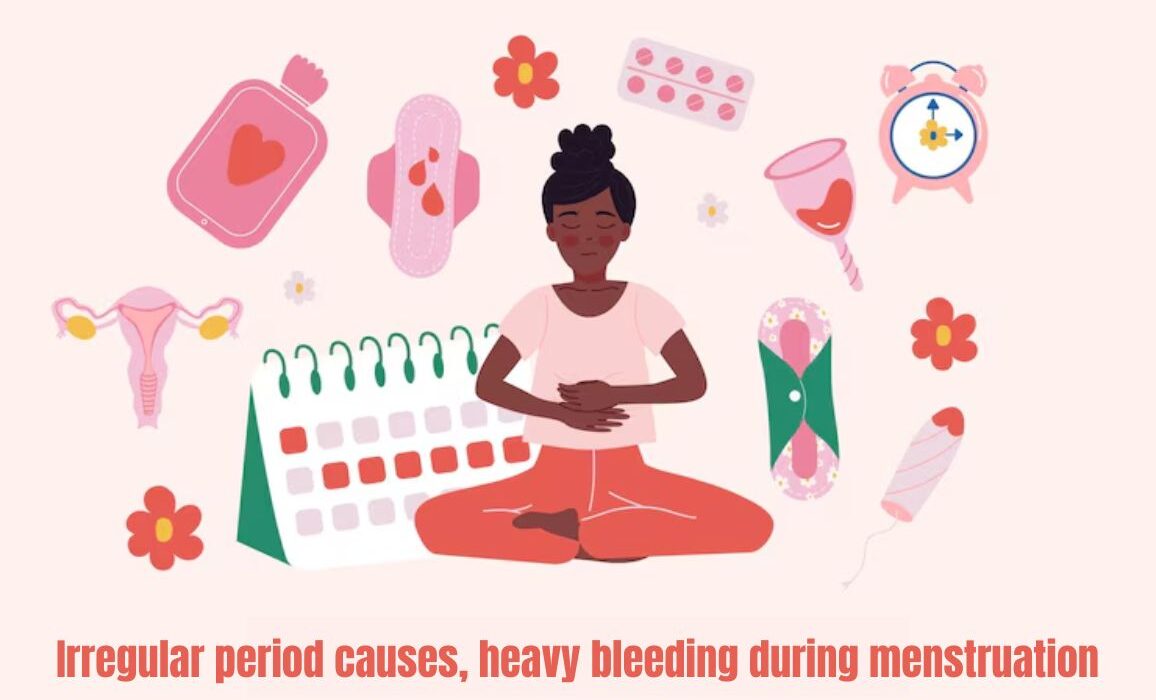Irregular period causes, heavy bleeding during menstruation
Few women have menstrual bleeding, and the causes of irregular periods are manifold and need to be medically addressed. Why? Heavy periods lasting for more than a few days are not good, are menorrhagia, and are a common concern.
Most women do not have sufficient blood loss for it to be known as heavy menstrual bleeding.
Heavy menstrual bleeding, previously referred to as menorrhagia or hematomunia, is a menstrual period with excessively heavy flow. It is a sort of abnormal uterine bleeding. Abnormal uterine bleeding needs to be taken care of medically. Consulting the physician is certainly important.
Some women do suffer from menstrual bleeding between periods, or even earlier or later in their cycles than expected. This sort of period bleeding is certainly known as abnormal uterine bleeding or irregular menstrual bleeding.
With heavy menstrual bleeding, blood flow, and cramping, it’s harder to do one’s usual activities. If a person dreads her period due to heavy menstrual bleeding, talking to a doctor is indeed a better way to resolve the health problem.
Symptoms
Symptoms of heavy menstrual bleeding can include:
- Soaking through one or perhaps more sanitary pads or tampons every hour for several hours in a row.
- Needing double sanitary protection in order to control one’s menstrual flow.
- Getting up at night to change sanitary pads or even tampons.
- Bleeding for more than a week.
- Passing blood clots larger than even a quarter.
- Limiting daily activities on account of heavy menstrual flow.
- Feeling tired, fatigued, or perhaps short of breath as the result of blood loss.
When to see a doctor?
Seeking medical help prior to the next scheduled examination, if any:
- Vaginal bleeding happens to be so heavy that it soaks at least one pad or perhaps a tampon an hour for more than two hours in a row.
- Bleeding between periods or even unusual vaginal bleeding.
- Vaginal bleeding after menopause.
Irregular periods causes
- Medications like anti-inflammatory drugs, anticoagulants, or even hormone medications can indeed affect a woman’s menstrual bleeding.
- Heavy bleeding can indeed be a side effect of intrauterine devices (IUDs) for birth control.
- Hormone imbalances are also reasons for this health issue, and the hormones estrogen and progesterone do regulate the buildup of the lining of the woman’s uterus.
More irregular periods causes:
Hormone imbalances
The hormones estrogen and progesterone regulate the buildup of the lining of the uterus. An excess of these hormones can lead to heavy bleeding.
Medical conditions
PID
Pelvic inflammatory disease (PID) and other infections can also cause irregular periods.
Endometriosis
Endometriosis happens to be another condition resulting in irregular periods.
Inherited blood disorder
Heavy menstrual bleeding can also be due to some inherited blood disorders that affect clotting.
Benign growths or cancers
Cervical, ovarian, or even uterine cancer can indeed cause heavy bleeding, but these conditions are not very common. Benign, or noncancerous, tumors in the woman’s uterus can cause heavy bleeding or long periods.
Benign growths in the given uterine lining (endometrium) can also cause a heavy or prolonged period.
Other possible causes
Anovulation
Lack of ovulation, or anovulation, does result in a lack of the hormone progesterone, thus causing heavy periods.
Adenomyosis
When glands from the woman’s uterine lining embed in the uterine muscle, heavy bleeding can also occur. This is referred to as adenomyosis.
Ectopic pregnancy
Contacting one’s doctor is important if the woman is bleeding during pregnancy. Normal pregnancy does interrupt menstruation. Few spottings during pregnancy, especially during the first trimester, are often of little concern.
Conclusion
Seek immediate medical attention if you are bleeding heavily during pregnancy. Even otherwise, heavy bleeding needs to be checked medically, if so during menstruation. Irregular periods’ causes must not be ignored.




